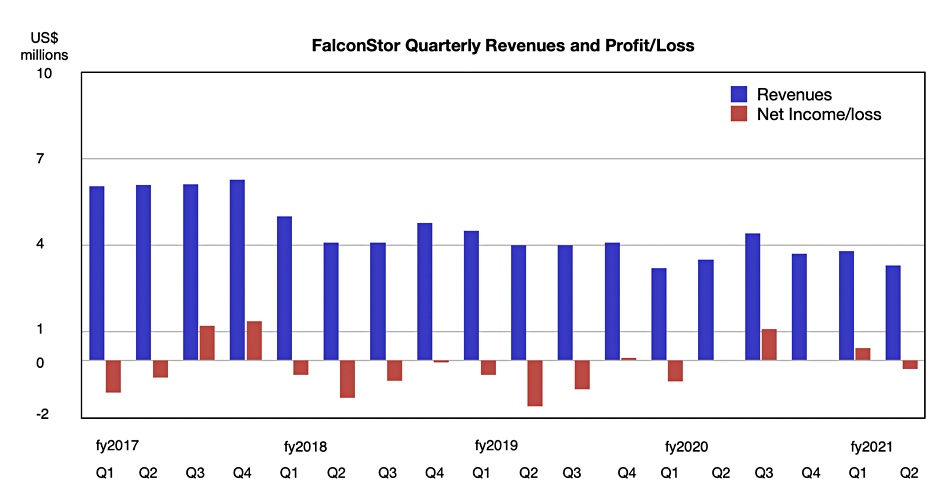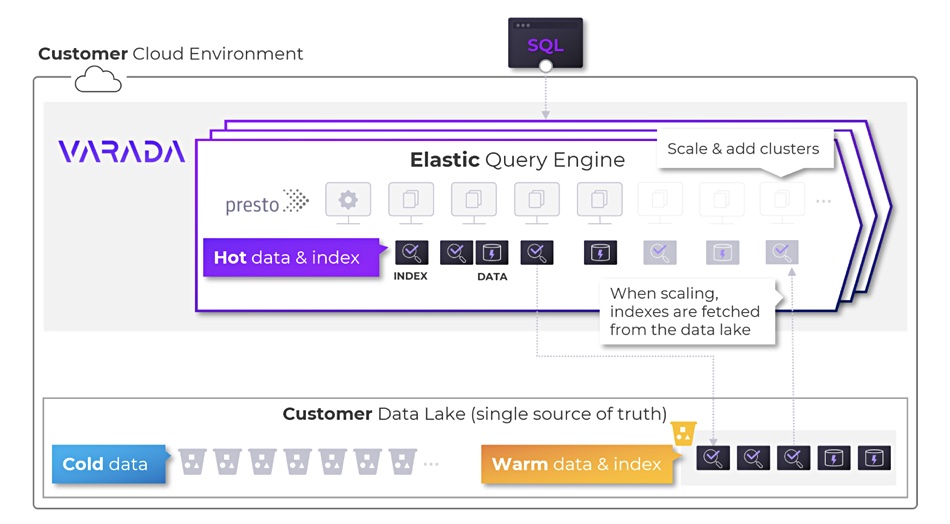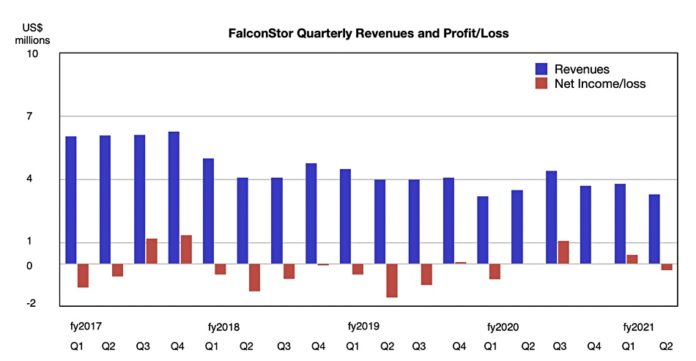A data lake analytics startup springs on to the stage with a fast funding round following its founding (nice alliteration — Ed). Ransomware attackers love architecture, engineering and construction firms. Recovering from a founding CEO disaster can take years, while going to court to get licensing fees from massive suppliers can be most rewarding. Data lake analytics acceleration is a good thing.
Our first five stories cover these points and then there is a shower of shorter items in this week’s comprehensive look at the storage industry.
Aha! Presto! Ahana!
Ahana, a startup company founded only last year with $4.8 million seed funding, has just raised $20 million in VC funding. It’s developing software to radically improve data lake analytics, using Presto-distributed SQL query engine software.
Presto, the open-source project created by Facebook and used at Uber, Twitter and thousands more, is said to be the de facto standard for fast SQL processing on data lakes, such as those using AWS S3. Ahana is developing a Presto-based SaaS offering.
Steven Mih, Ahana co-founder and CEO, said: “As more open-source-based companies like Confluent and Neo4J see extreme momentum in today’s market, Ahana’s open-source go-to-market coupled with its deep involvement with the Presto Foundation has positioned Ahana as the Presto company and leader in the open data lake analytics space.”
Under the Linux Foundation’s Presto Foundation, the Presto open-source project has seen massive growth just in the past six months, including hundreds of thousands of pulls of the Docker Sandbox Container for Presto hosted by Ahana, over 1000 members in global Presto meetups, and a total of ten companies that have signed on to the Presto Foundation.
The cash will be used to accelerate engineering and contributions to the open-source community, as well as expanding Ahana’s go-to-market staff.
The financing round was led by Third Point Ventures and included existing investors GV (formerly Google Ventures), Leslie Ventures, and Lux Capital. Robert Schwartz, Managing Partner, Third Point Ventures will join Ahana’s Board of Directors.
AEC firms are prime ransomware targets
An Egnyte ransomware report says Architecture, Engineering & Construction (AEC) industry customers are more than twice as likely to suffer from ransomware attacks than customers in other industries.
Egnyte’s “State of Ransomware Research Report for Architecture, Engineering and Construction Report” also found that companies with more than 1000 employees were at the highest risk of attack, with the overwhelming majority of attacks targeting North American companies.
The report says AEC firms have several factors working against them. They are very schedule-driven, and any delays due to lack of access to their project files will significantly impact their costs, project timelines, and damage their brand reputations.
AEC firms have a significant portion of their employees working remotely and many companies maintain a shared information environment with a range of outside contractors on job sites, which opens additional entry points for attackers to exploit. AEC firms may be more likely to pay a ransom to get up and running more quickly than other industries.
Egnyte provides file collaboration and content governance software and services, which include ransomware protection.
FalconStor results
Recovering data protector and archiver FalconStor reported results for its second 2021 quarter, ended on June 30, 2021. Revenues of just $3.3 million were down 6.9 per cent year-on-year, with a loss of $300,000 — worse than the nil profit a year ago.
CEO Todd Brooks said: “While we were disappointed that our second quarter total revenue declined year-over-year by 6.9 per cent, total revenue for the first half of 2021 increased year-over-year by 6.1 per cent. Over the next year, we expect our year-over-year quarterly revenue growth to continue to stabilise as our sales pipeline becomes more predictable, and we expand our markets.”

There was a two per cent product revenue decline to $1.602 million, compared to $1.632 million in the second quarter of fiscal year 2020.
This is the tenth year of Falconstor’s last chance recovery since its founding CEO’s court case and suicide in 2011. It’s a heck of a long, long way back.
Netlist results
SSD and memory module supplier Netlist earned revenues of $64.4 million in its second quarter ended July 3, 2021 with $40 million in licensing fees and $24.4 million in product revenue — which was up 123 per cent quarter over quarter and up 64 per cent consecutively.
There was a profit of $27.8 million, which contrasts with the year-ago loss of $1.8 million.
Netlist CEO C.K. Hong said: “During the quarter, we delivered record financial results from strong product sales and the execution of a comprehensive licensing agreement with SK hynix. With this renewed momentum, we’re excited to ramp investments in strategic areas of the business while remaining focused on the intellectual property enforcement actions against infringing parties.”
One of the alleged infringing parties is Google and a licensing agreement there could deliver a significant revenue upturn.
At quarter-end cash, cash equivalents and restricted cash was $54.4 million, total assets were $72.9 million, working capital was $35.2 million, total debt and accrued interest, net of debt discount, was $17.4 million, and stockholders’ equity was $35.9 million.
Varada adds warm data lake tier
Datalake query accelerator Varada revealed version 3.0 of its analytics package, saying it delivers a powerful and cost-effective alternative to offerings like Snowflake, Redshift, Athena, Preso, Trino and BigQuery for at-scale. big data analytics users who rely on indexing to extract insights from massive, unstructured data sets.
It delivers a claimed dramatic increase in cost performance and cluster elasticity as compared to the previous version. In addition, version 3.0 eliminates the need to keep high-performance and expensive SSD NVMe compute instances idling when the cluster is not in use.
Eran Vanounou, CEO of Varada, said: “With version 3.0, the Varada platform is now the most powerful and cost-effective way to leverage the power of big data directly atop of your data lake.”

He added: “We’ve separated the index and data from the SSD nodes, creating a ‘warm’ tier in the data lake that allows us to preserve those indexes much faster and at a much lower cost. By doing so we’re bringing the power of cloud computing scaling to big data indexing.”
Version 3.0 of the Varada platform includes three layers. The first is the hot data and index layer, in which SSD NVMe-attached nodes (in the customer’s Virtual Private Cloud) are used to process queries and store hot data and cache for optimal performance. The second is the warm index and data layer, where an object storage bucket on the customer’s data lake is used to store all indexes for scaling purposes. The third layer is the customer data layer (“cold”), which remains the single source of truth.
V3.0’s separation of compute and storage lets users elastically scale clusters out and in as query traffic fluctuates, avoiding the waste of over-provisioning and idle resources.
Shorts
Data protector and cyber-security outfit Acronis released the Acronis Cyberthreats Report Mid-year 2021 update, an in-depth review of the cyberthreat trends the company’s experts are tracking. It warns that small and medium-sized businesses (SMBs) are at particular risk based on the attack trends seen during the first six months of the year. Phishing attacks are rampant, data exfiltration continues to increase and remote workers are a prime target. Download the report here.
Backblaze’s somewhat oddly titled Principal Cloud Storyteller, Andy Klein, blogged about its disk drive statistics. No real surprises: most failed infrequently, some more so than others, and three recorded no failures.
Some highlights:
- 6TB Seagate (ST6000DX000) — The average age of these drives is over six years (74 months) and with one failure over the last year, this drive is ageing quite well.
- 12TB HGST (HUH721212ALE600) — After recording a quarterly high of five failures last quarter, they are back on track with zero failures this quarter and a lifetime failure rate of 0.41 per cent.
- 16TB Western Digital (WUH721816ALE — These drives have only been installed for three months, but no failures in 624 drives is a great start.

Data protector and security supplier Code42 is making changes to its CrashPlan product. CEO Joe Payne tells us: “We are aggressively moving on-premise customers to our cloud version and we have stopped all development on the on-premises version. The cloud version is a much safer and more capable product so we are urging all customers to get to the cloud.” Sounds like a good plan; SaaSification rules!
Faction announced that its Multi-Cloud Data Services for Dell EMC PowerScale is now available on the Microsoft Azure Marketplace. Faction has also achieved “co-sell ready” and “Azure IP co-sell incentivized” status through the Microsoft One Commercial Partner (OCP) Program. By deploying Faction Multi-Cloud Data Services for PowerScale from the Azure Marketplace, customers can take advantage of Azure cloud compute with time-saving deployment and management of PowerScale storage. An ESG report can tell you more.

SaaS data protector HYCU has appointed Justin Endres as its SVP for international sales. He spent nearly five years at SolarWinds (2007–2011) along with several lead sales roles at Webroot, AlienVault and Mist before his more recent role at ActivTrak. Bogdan Viher, VP Sales International, will report to him. Endres plans to build out HYCU’s channel and partner community around MSPs/MSSPs amongst other things.
DRAM and flash fabber and SSD shipper Micron has started paying dividends, with a $0.10/share quarterly payment due on October 18. Share repurchases are its primary method of returning capital [indirectly] to shareholders.
Data protector and DR vendor NAKIVO released v10.4 of its Backup & Replication product. Features include immutable repository, two-factor authentication, and instant granular recovery for Nutanix AHV. Customers can perform recovery to the original or a different VM or export the data to a custom location without recovering the entire VM.
Flash controller supplier Phison announced the expanded sharing of flash industry-related content through a blog platform. It aims to be the “go-to” resource for everything related to NAND flash and weekly posts are created by Phison engineers, leaders, product and system architects.
Pure Storage’s Portworx unit announced Portworx Enterprise v2.8. It has new integrations with Pure Storage which make it simpler to run Kubernetes applications at enterprise levels of scale and resiliency. Kubernetes apps running on the new software are supported by the predictive-capabilities of Pure1, and there is a better container-native storage experience for VMWare Tanzu as well as any Container Storage Interface (CSI)-compatible storage system.
File and object storage software biz Scality announced that compliance auditing firm Cohasset Associates has certified Scality RING as SEC 17a-4(f) compliant — said to be a data security milestone achieved by only a handful of storage systems. Think WORM, data retention, legal holds and auditing. Get Cohasset’s report here.
The SNIA has an NVMe SSD Classification White Paper. It describes use cases for NVMe SSDs used in enterprise servers, enterprise storage, data center/hyperscale servers, and data centre/hyperscale storage environments. Each has distinct requirements and application environments, which are covered in requirements for form factors, power, performance, latency, endurance, capacity, management, and features. There will always be exceptions to these guidelines, but these are generally fit profiles for NVMe SSD classification The paper is designed as a companion to the NVMe SSD Classification table on the SNIA.org web site.
SoDA, the software division of Integrated Media Technologies, announced it has made its enterprise software application and intelligent data management system available in the AWS Marketplace. SoDA is also included in the reference architectures including Media Supply Chain, Media2Cloud, and AWS Media Intelligence (AWS MI) solutions, which allows rich AWS media pipelines.
Storage SW stack reinventor StorONE says its customer America’s Test Kitchen (ATK) has expanded its use of StorONE for NAS and VMware. Two years ago ATK started used StorONE for archiving and protecting its media assets. Dustin Brandt, Director of IT at ATK, said: “StorONE enables us to archive and consolidate 20+ years of digital assets, use it as an automated backup target, serve up storage for virtualisation development, and provision on-demand storage shares for project development.
“We’re doing this at a price that is dramatically less than competing single-use systems, and for the types of files and content that we deal with, we’ve even found storing our backups on StorONE to be less expensive and more accessible than putting them in the cloud.”







